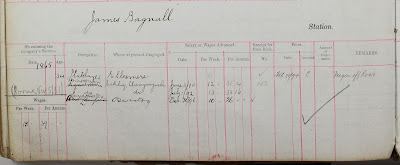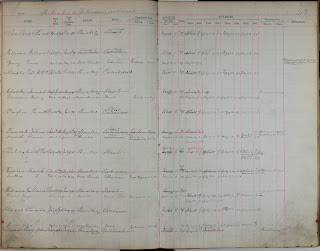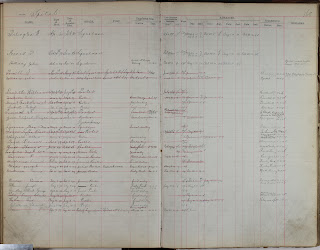Cheshire Railways: First Stop - The History is available here.
In Ellesmere it was platelayers such as James Bagnall that inspected and maintained the lines, or in Birkenhead it was shunters such as Thomas Bayliss that took on the dangerous work of connecting and disconnecting engines. Porters such as Alfred Pryce Jones carried travellers’ luggage in Spital, and gatewoman E Alford operated the level crossing in Minsterley. There were many, many more jobs on the railways such as ticket collectors, signalmen, waiting room attendants, guards, foremen, lamp lads, breaksmen, station masters and many more besides.
All these jobs created records: staff registers, wages books, record cards, accident report books and workmen compensation books. It is rare that employee records survive in business collections because they were routinely destroyed when they were no longer needed by the company. Thankfully, in our NPR railway collection many have survived that contain priceless information on the people who worked on the railways such as James Bagnall, Thomas Bayliss, Alfred Pryce Jones and E Alford. The records are in no way complete and coverage is patchy, however, if you had an ancestor who worked on the railways then read on, we may well hold some of their records.
The history of the railways is one of company mergers and shared lines and therefore to find the records of your ancestors you need to know which railway company they worked for. They may have worked for two companies in the case of the London & North Western and Great Western Joint Railway. Each company also had many departments and job roles, so it is also useful to know the type of job your ancestor may have had. The staff registers that survive cover the following companies: London & North Western and Great Western Joint Railway, Cambrian Railways, London & North Western Railway, Great Western Railway, North Staffordshire Railway (latterly London Midland and Scottish Railway), Crewe Engineering Works and Earlestown Wagon Works.
These registers cover railway staff working over a large area including Cheshire, Shropshire, Herefordshire and nine counties in Wales. The information within them provides a summary of each railway employee’s career, the actual details varying slightly between one register and another. The registers were compiled from the late 1860s up to c1920 although many staff were in service earlier, some from the earliest years of the railway line itself (1840s).
In the case of the Cambrian and Great Western registers further details are provided of those staff who remained in service after 1920, usually restricted to wage or salary statements, and some of these extend into the 1950s era in British Rail days. Of the several railway departments the registers held here include employees in the coaching and traffic departments, those dealing with operations such as Porters, Signalmen and guards, and also salaried staff which include management and clerical workers such as Superintendents, Station Masters, booking and other Clerks. Among the other grades represented are Agents, Ticket Examiners, Left Luggage Office Staff, Van Drivers, Slip Boys (Horse Boys) and Weighing Machinemen. Seaman working on the River Mersey at Birkenhead - masters, mates and firemen - are featured, as well as waiting room attendants, gatekeepers and cleaners.
Two databases have been compiled as an index to these records. One covers the railway staff registers 1869-1950 and one covers the Crewe Railway Works c1890-1928. Other records not covered by the index can be searched on our online catalogue. Have a search and see what you can find - we may have a record of your ancestor that adds that crucial detail to your family history!
Look out for Third Stop - Railway Plans - coming soon!
All these records and more can be viewed at Cheshire Record Office in Chester.






No comments:
Post a Comment